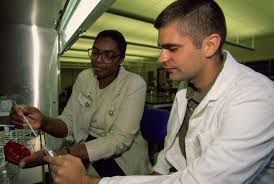
Is your goal to become a doctor? Do you want to put yourself on a fast track to medical school and making your dream a reality? If so, you may want to consider applying for a BS/MD program.
In this article, I'll explain what these programs are and go over exactly how to get into a BS/MD program, so that you can be one step closer to your dream of becoming a doctor.
What Is a BS/MD Program?
A BS/MD program offers you admission to medical school if you meet certain minimum requirements while you're in college or applying to colleges. You can apply for a BS/MD program as a high school student during the regular college application process. Additionally, there are BS/MD programs you can apply to as an underclassman in college. Most people begin applying to med school the summer between their junior and senior years of college, so BS/MD programs can let you know you've been accepted to med school years before many of your peers find out.
Much of the information in this article is geared towards current high school students who are considering applying to programs that admit first-year students, but some of the advice and information also applies to current college students who are contemplating entering a BS/MD program.
Typically, for BS/MD programs, you have to maintain a 3.5 GPA while in college, and many programs still require you to take the MCAT, the medical school entrance exam. However, assuming you meet the minimum requirements, you'll be guaranteed admission to the medical school that's associated with your BS/MD program.
Usually, it takes at least eight years to finish your undergraduate and medical school programs, but sometimes, you can do so in six or seven through a BS/MD program. Upon completion of the program, you'll have a Bachelor of Science and a Doctor of Medicine degrees.
Requirements for Getting Into a BS/MD Program
Getting into a BS/MD program is extremely difficult. Each program has different requirements, but, in all cases, you need a high GPA and stellar standardized test scores. The requirements are usually much stricter than those for other undergraduate applicants.
The average unweighted high school GPA for an admitted student to the program is a 3.9. The minimum ACT score is a 24, but the average for admitted students is a 32. The minimum SAT score is 1160, but the average score for an admitted student is 1420. So, even if the bare minimum that a BS/MD program requires isn't that competitive, expect to need stellar academics if you want to actually get accepted because the competition will be tough.
Also, for most BS/MD programs, you have to write a personal statement, get recommendations, and do an interview. Additionally, you'll be evaluated on your extracurricular activities. These programs want to see that you've demonstrated leadership and achievement; furthermore, they like to see involvement in extracurriculars related to health and medicine.
Here's a chart with the minimum GPA and standardized test requirements for some BS/MD programs to give you an idea of what you need to be eligible for most of these programs. Keep in mind that you'll probably need to comfortably exceed the minimum requirements to give yourself a decent shot at getting into these programs.
| School | GPA | SAT | ACT |
| University of Alabama at Birmingham | 3.5 | 1360 | 30 |
| Baylor University | 3.7 (or top 5% graduation class) | 1430 | 32 |
| University of Cincinnati | No minimum requirement | 1300 | 29 |
| Drexel University | 3.5 | 1420 | 31 |
| Florida Atlantic University | 4.3 weighted | 1490 | 33 |
| University of South Florida | 4.0 weighted | 1500 | 34 |
| The College of New Jersey/New Jersey Medical School | 3.8 (approximately) and top 5% | 1500 | 34 |
| Rutgers University | No minimum requirement | 1400 | 32 |
| Saint Louis University* | No Cs | 1330 | 30 |
*Program is test optional
While the table should give you an idea of the minimum requirements of different BS/MD programs, as mentioned above, you'll likely have to do substantially better to have a reasonable chance of getting accepted. To give yourself a good chance of getting into a BS/MD program, you should shoot for at least a 3.8 unweighted GPA and either a 1500 SAT score or a 34 composite ACT score. Basically, getting into a BS/MD program is on par with getting admitted to the most selective colleges in the country.

Dom Sagolla/Flickr
How to Get Into a BS/MD Program: Application Components
Now I'll focus on each component of your BS/MD program application and offer advice and tips to make yourself as competitive for these programs as possible.
Your GPA and Classes
Your high school transcript is probably the most important component in determining whether or not you gain admission to a BS/MD program.
First, your goal should be to get as close to a 4.0 GPA as possible. Also, you should make sure to excel in the most rigorous math and science classes offered at your school. Because pre-med programs and medical school are very science intensive, you want to show that you're extremely capable of doing well in demanding science classes. Depending on what classes your school offers, you should plan on taking at least two of these three classes: AP Biology, AP Chemistry, and AP Physics.
Your Standardized Tests
Again, you need exceptional SAT/ACT scores to make yourself competitive for admission. You should follow our tips to get a perfect SAT or ACT score.
We recommend taking the SAT/ACT for the first time by the fall of your junior year. If you don't reach your target score, you can retake the test in the spring, and, hopefully, you won't have to worry about it during your senior year when you'll be busy with school, extracurricular activities, and college applications.
Know how long you'll have to study to reach your target score. Remember that you want to get at least a 1500 on the SAT or a 34 on the ACT to give yourself a good chance to get into a BS/MD program.

Your Extracurricular Activities
BS/MD programs want to admit students who have exceptional achievements both in and out of the classroom. Your commitment to your extracurricular activities demonstrates your willingness to do more than what's required and your initiative to actively pursue your passions.
Because BS/MD programs are looking for students who are passionate about pursuing a career in medicine, you should have at least a couple of extracurriculars related to your interest in the medical field. You may want to volunteer at a hospital, shadow a doctor, help a professor with medical research, or get involved with a summer medical program.
Extracurriculars are a great way to separate yourself from other applicants who have similar grades and test scores. You'll enhance your applications and gain valuable experience by pursuing leadership positions, conducting research, and participating in other activities that show your potential and achievement in the medical field.
Your College Essay
Your college essay or personal statement is another critical component of your college application. The essay gives the school an opportunity to get to know you outside of your grades and accomplishments. It can give you a chance to explain any unique obstacles you've had to overcome or express why you're motivated to become a doctor.
College essays can be challenging and time-consuming. Learn what you need to know about college essays and how to come up with great essay ideas.
I recommend starting to work on your college essays the summer before your senior year or at the beginning of your senior year at the latest. The essays aren't very long, but you want to give yourself ample time to write and revise your college essays. I've worked with hundreds of students who procrastinated on their college essays, and they ended up not having enough time to produce their best work.

In a few years, you too could be sporting a stethoscope.
Your Recommendations
While your college essay allows a school to get to know you from your own perspective, your recommendations help a college get to know you from another person's perspective.
Most BS/MD programs will require recommendations from your teachers. Ideally, at least one of your recommendations will come from a science teacher who can speak glowingly about your science skills, character, and desire to learn. Make sure you know what a good recommendation looks like and how to ask for a letter of recommendation.
You can initially ask teachers if they would be willing to write you a letter of recommendation at the end of your junior year. That will give them time to think about what they're going to write, and you can get them to agree to write a recommendation for you before they become inundated with requests during your senior year. Then, you can submit a formal request at the beginning of your senior year. For your reference, here are examples of excellent recommendation letters.
Your Interview
Many BS/MD programs do have an interview requirement. I know interviews can be scary, but with some basic preparation, the interview should only enhance your application. Because these programs are so selective, they try to take every necessary step to ensure they admit the best applicants. Be ready to answer why you're interested in that particular program and why you want to become a doctor. Avoid generic answers that could be given by any applicant; incorporating anecdotes and specific examples will strengthen your interview responses.
Don't worry about the interview too much. By the time you interview, you'll have completed most of the hard work needed to apply to a BS/MD program. As long as you're respectful, you've done your research on the program, and you thoughtfully answer the questions you're asked, you should be just fine.

Is a BS/MD Program Right for You?
At this point, you may be wondering if you want to do what's necessary to get into a BS/MD program. These programs aren't ideal for everyone, but they're excellent options for certain types of students.
If you have your heart set on becoming a doctor, a BS/MD program will set you on a direct path toward becoming one. You won't have to deal with the stress of applying to medical school, and you'll possibly be able to finish medical school in less time.
However, a BS/MD program may not be the best option for you if you're not completely sure that you want to be a doctor. In fact, most of my friends who started college intending to pursue medical school ended up changing their plans.
Furthermore, many of the most selective and prestigious colleges and medical schools aren't connected with BS/MD programs. If you want to attend a top college or medical school that isn't associated with a BS/MD program, then perhaps you should just make yourself competitive for admission to Ivy League schools and not worry about BS/MD programs.
Schools like Harvard and Stanford don't have BS/MD programs, but the vast majority of their pre-med students get into medical school. In 2012, 93% of Harvard pre-med students with at least a 3.5 GPA were admitted to medical school.
Finally, BS/MD programs tend to be demanding, and the workload can be very rigorous, especially if you're in a six or seven-year program. Make sure you're capable of doing the work that will be required, and more importantly, make sure you really want to do the work.
What's Next?
Curious about what classes you'll have to take in college for pre-med? Our article on the requirements for med school has you covered. Plus, check out our list of the seven books every pre-med student should read here.
You'll need top standardized test scores to get into a BS/MD program. Read our guides, written by a perfect-scorer, on how to get a perfect score on the SAT and the ACT.
Want a great extracurricular for BS/MD programs? Learn how to volunteer at a hospital and get a first-hand look at the work doctors do.
Have friends who also need help with test prep? Share this article!

Justin has extensive experience teaching SAT prep and guiding high school students through the college admissions and selection process. He is firmly committed to improving equity in education and helping students to reach their educational goals. Justin received an athletic scholarship for gymnastics at Stanford University and graduated with a BA in American Studies.



































 Holly R.
Holly R.